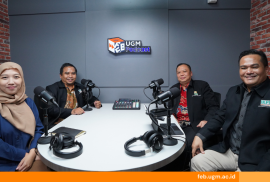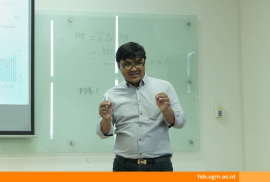Wednesday (8/21) Faculty of Economics and Business Universitas Gadjah Mada in collaboration with ANU Indonesia project held an academic forum and policy maker Mubyarto Public Policy 2019. Seminar Hall, 8th Floor Auditorium The Learning Center Building of the Faculty of Economics and Business, Gadjah Mada University became the venue for this event . The event started at 9.00 with remarks by the Vice Dean for Cooperation and Alumni of the Faculty of Economics and Business UGM, Amirullah Setya Hardi, PhD. and representatives from the Australian National University (ANU) Indonesia Project. “This is the third annual event in UGM”, Amirullah said.
Professor Benjamin Olken from the Department of Economics’s Massachusetts Institute of Technology began the discussion on the topic, “Designing Anti-Poverty Programs in Emerging Economies in the 21st century: Lessons from Indonesia to the world”. Professor Olken discussed the random evaluation carried out in collaboration with the Indonesian government which included the importance of community-based and self-targeting, the role of tangible information on reducing leakage of benefits, and the medium-term impact of conditional cash transfer programs. Professor Olken also explained the challenges of governments in developing countries in dealing with, designing and implementing social protection programs.
The event continued with keynote speech session by representatives of Tim Nasional Percepatan Penanggulangan Kemiskinan (TNP2K) Dr. Bambang Widiyanto. Bambang explained about the evidence-based approach to the policy making process. He gave an example of increasing transparency and accountability in delivering education cash assistance. According to him, before 2013, less than 10% of students from poor households received BSM, so to improve the accuracy of BSM delivery, the previously school-based delivery system had to be changed to households-based. Bambang also said that government spending on education in 2016 amounted to USD 16.5 million, half of which included teacher salaries and allowances, but the professional teacher allowance resulted in no increase in student learning outcomes. “Teachers in remote areas receive remote area allowances at one time their basic salary. Certified teachers receive professional allowances, also at one time their basic salary, but teachers who receive remote area allowances have higher absenteeism rates than those who are didn’t get”, he said. In addition, he also explained the certainty of accountability and community participation to improve education services, electricity subsidy reform, and budget convergence.
Also present, Dr. Elan Setiawan from UGM, Dr. Mulyadi Soemarto from UGM, and Dr. Firman Witoelar Kartaadipoetra from ANU. Elan Setiawan explained about various issues about promoting evidence-based social policy in Indonesia. He said that producing strong evidence was only halfway to promoting effective policy. The other half way is to get support for adoption and capacity on the part of the government to properly implement the policy or program. In addition, Elan also explained about the Family Hope, Raskin and Badan Pangan Non Tunai (BPNT), as well as how to increase the targeting of social protection programs.
Source: Ika/PR




